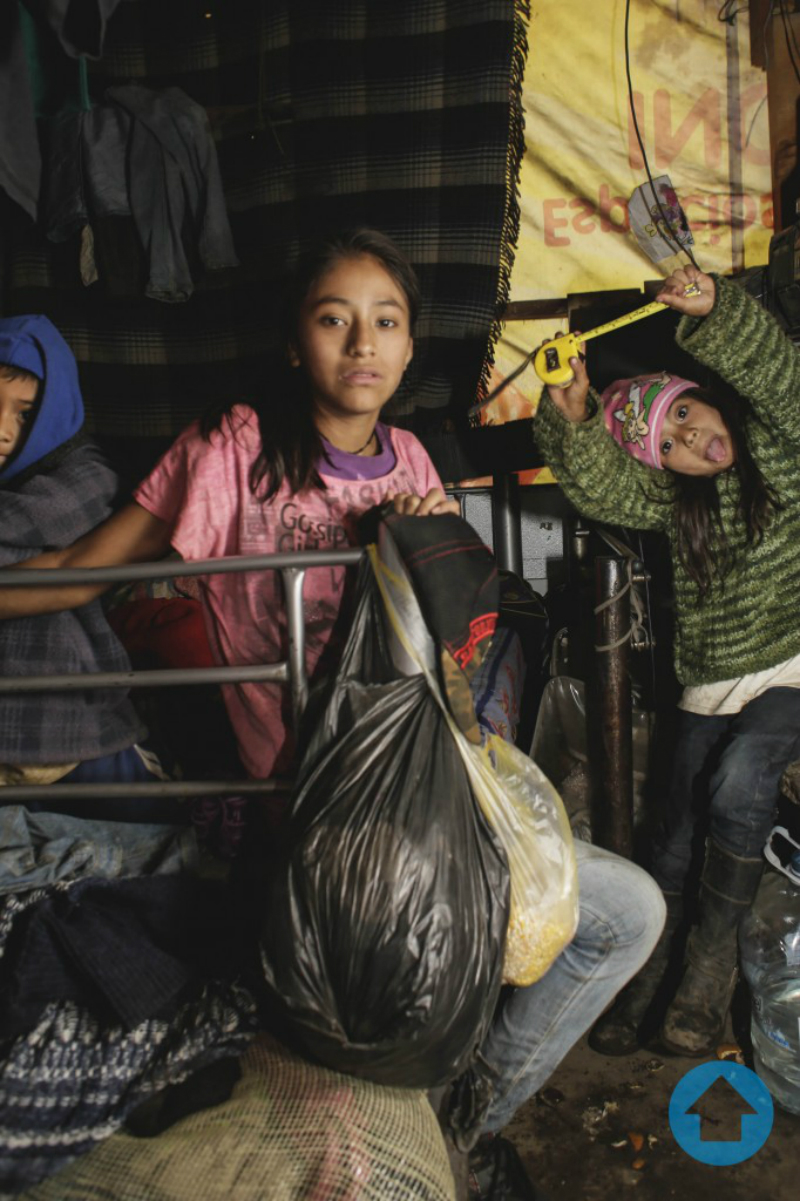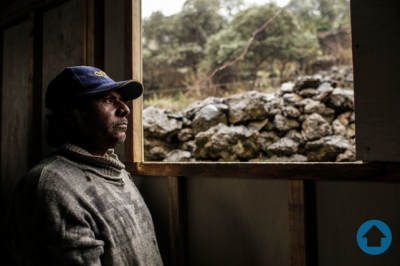
Image credit: Monica Godefroy, TECHO. Used with permission.
Mexico is home to more than 119.5 million people, according to data released by the National Institute of Statistics and Geography. According to the Mexican government's own statistics, almost half the population lived in poverty in 2012, when 13 percent of the country also endured extreme poverty.
These are unattractive figures for a nation that aims to expand free trade with countries like neighboring United States and Canada. Poverty also complicates Mexico's hopes to become a regional leader on development issues in Latin America. The country's current poverty, of course, denotes that people lack many things, which only adds to the significance of work by international organizations like TECHO (which means “roof” in Spanish). TECHO is an anti-poverty group that promotes community development in Latin America and the Caribbean, building homes and offering free vocational training.
Even in the country's capital, Mexican poverty can be severe. Earlier this month, one of TECHO's staff members named Luz, described what she witnessed working in the area of Xochimilco, where there is a shortage of many basic necessities:
“Las Cruces” es un caso particular -pero no aislado- por ser una comunidad vieja que se formó hace aproximadamente 80 años en Xochimilco y al día de hoy cuenta con aproximadamente 500 familias, pero que tenga tanto tiempo no significa que esté consolidada o cuente con una buena infraestructura. Desde que sus habitantes llegaron a la zona comenzaron a organizarse para llevar servicios básicos a la comunidad y al día de hoy al menos un 15% siguen acarreando agua, no tienen electricidad y sólo 70% tienen drenaje.
Muchos de los barrios o colonias de la Ciudad de México tienen la misma antigüedad y cuentan con todos los servicios.
“Las Cruces” [The Crosses] is a particular, though not isolated, case. This is an old community established about 80 years ago in Xochimilco, and today it has approximately 500 families. But having existed all this time doesn't mean it's consolidated or built up a good infrastructure. Since its residents arrived in the area, they started organizing themselves to bring basic services to the community, and today at least 15 percent still hauling their own water. There is no electricity and only 70 percent have drains.
Many neighborhoods or colonias [communities] in Mexico City are just as old and have all these amenities.
Luz also shares some alarming numbers:
El 28.4% de los habitantes de Xochimilco viven en extrema pobreza. Eso es una tercera parte de su población y me parece gravísimo. Quizás eso no suena tan alarmante, aunque no veo cómo no habría de serlo, pero para que te des una mejor idea: 16 millones de personas en México habitan en viviendas precarias, eso equivale a la población estimada de los Países Bajos, Chile o Ecuador. ¡Es la población de un país entero! y además, 7 de cada 10 personas pobres viven en las ciudades.
Twenty-eight percent of the residents of Xochimilco live in extreme poverty. That's a third of the population and it seems quite serious to me. This might not seem so alarming, although I don't see how it couldn't be. For you to have a better idea, remember that 16 million people in Mexico live in substandard housing. That equals the estimated population of the Netherlands, Chile, or Ecuador. It's the population of a whole country! Besides that, 7 out of 10 poor people live in the cities.
TECHO focuses on the most precarious settlements, organizing locals into “joint action” projects, which receive TECHO's help to generate solutions for overcoming poverty.
What are some examples of solutions? In Mexico, TECHO has helped families and volunteers build more than 3,000 emergency homes. The organization has also trained locals in various trades, and established schools for children in certain settlements where families endure especially dangerous conditions and the absence of at least one basic amenity.

Image credit: Monica Godefroy, TECHO. Used with permission.
In 2012, thanks to these actions, Margarita Zavala, then Mexico's first lady, recognized TECHO by giving it an honorable mention in the ceremony for that year's National Award for Volunteer Action and Solidarity. And that isn't the only award TECHO has received.
As Global Voices has reported in the past, Mexico is a country that not only faces poverty, but also social discrimination. Indeed, conspicuous “glamour and excess” are not uncommon among Mexico's richest citizens.
With so many challenges, TECHO's work is a rare source of good news in Mexico's fight to eradicate poverty.






